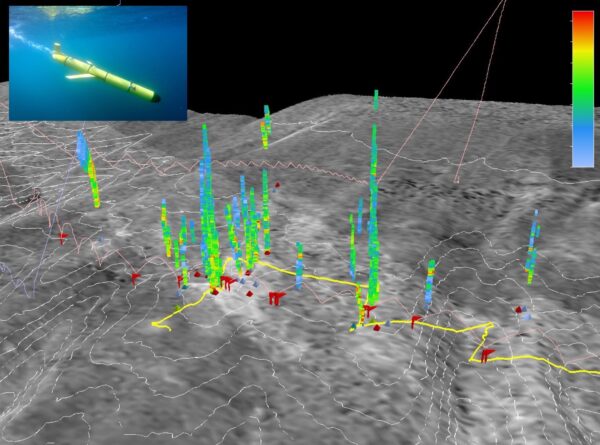Workshop – Autonomous Investigation during Drilling (AID)

Backscatter seafloor map showing location of doppler sonar acoustic anomalies from AUV interpreted as methane bubble plumes on the Costa Rican margin. Multi-colored columns represent bubble plumes interpreted from 30 kHz MBES.
Date: January 15-17, 2025
Location: Woods Hole Oceanographic Institution, Woods Hole, MA, USA
Workshop Coordinators: Richard Camilli (Woods Hole Oceanographic Institution), Lori Summa (University of Texas, Austin; Rice University), and Peter Vrolijk (New Mexico Institute of Mining and Technology)
Deadline to apply: October 15, 2024 (see Workshop Format & Participation tab for details)
Autonomous vehicles (AVs) operating in the oceans, both under and on the ocean surface, now offer valuable information about ocean conditions and the seafloor for reasonable capital cost and little operational cost. Current operational state and anticipated future developments of AVs have the potential to expand the impact of scientific ocean drilling through their incorporation on future drilling expeditions. AV applications relevant to scientific ocean drilling objectives include:
- high-resolution mapping of water-column and seafloor states in the region of drill sites,
- gathering and transmitting data from seafloor observatories,
- expanding the scope of data complementary to drilling,
- monitoring marine mammal activity and contributing to necessary environmental monitoring during drilling activities at minimal operational (time + expense) cost.
This workshop will assemble experts from ocean engineering, Earth science, and drilling operations who will craft a framework for how AV deployment during drilling expeditions will expand the scope of scientific data collected and support drilling operations. Recently completed expeditions representing each of the ocean drilling focus areas will be used as test cases for how this framework might be applied to potential future drilling expeditions. The resulting framework, published as a report, will serve as a guide for drilling proposal proponents to consider how to incorporate AV operations into a future drilling expedition.
- Investigate new AV technologies that can complement and broaden the types of scientific results typically obtained during drilling expeditions. Influence the rapid pace of AV and sensor development in a way that benefits scientific ocean drilling.
- Identify the specific science benefits and issues of adding data collected with sensor-equipped autonomous underwater vehicles (including gliders), and surface vehicles (AUVs, AUGs and ASVs[1]) that would operate simultaneously while drilling.
- Evaluate the merits of using these vehicle platforms for environmental monitoring to assure regulatory compliance.
- Identify potential financial advantages that could be gained through collaboration with other science organizations (e.g., OOI, NOAA, NASA) using a future drilling platform as a ship of opportunity for deployment/recovery of AVs.
- Establish the vessel and staffing requirements necessary to pursue simultaneous operations and make those results available to the broader ocean drilling and ocean science communities.
- Expand the existing scientific ocean drilling community by recruiting experts from other disciplines.
[1] AUV = Autonomous Underwater Vehicle; AUG = Autonomous Underwater Glider; ASV = Autonomous Surface Vehicle
This 3-day workshop will include keynote and poster presentations that will introduce participants from different disciplines to key science and technology opportunities and issues. Much of the time will be devoted to small cross-disciplinary group discussions that will identify potential missions that could complement different types of drilling expeditions and develop an initial outline of operational requirements and risks.
The workshop will take place at Woods Hole Oceanographic Institution’s Autonomous Vehicles and Sensor Technologies (AVAST) center, which is an innovation hub focused on ocean technology development and applications. AVAST’s conference rooms and social hubs will serve as the workshop’s main venue. Located in the David Center of WHOI’s Quissett Campus, AVAST provides access to advanced AV and sensing technologies currently under development and transitioning to operational status.
We aim for a total of 25-30 attendees, including participants from groups that work on robotics and execute AV surveys, and scientists and ship operators from the scientific ocean drilling community, both experienced and early career, to explore specific opportunities for simultaneous observation using AVs with current and future drilling platforms. Applicants must submit a brief statement of interest to the workshop coordinators. That statement should include prior expertise specific to the workshop topic if applicable, and a CV. Students will need to also provide the name and contact information for a reference. Criteria for participation will include: (1) depth of knowledge in either engineering, operations, or ocean drilling/marine science focus areas, and (2) interest in areas extending beyond personal expertise and a willingness to craft collaborative approaches to ocean and ocean basin science, including tectonics and climate history, using new technologies, and with particular emphasis on broadening participation in future drilling studies.
Limited travel support is available for U. S.-based participants from the U.S. Science Support Program (USSSP), and workshop participants requesting travel support should indicate whether they require full, partial, or no travel support to attend (e.g., identify airfare, ground transportation, lodging, and/or food expenses to be reimbursed). Workshop coordinators seek to optimize participation based on financial need, expertise, and career stage; early career participants may be prioritized for USSSP travel support.
Application & Support Request Deadline: October 15th
Workshop Invitations Distributed: early November
Submit application materials to workshop coordinators by October 15: R. Camilli (rcamilli@whoi.edu), L. Summa (llsumma@att.net), and P. Vrolijk (dimeguru@gmail.com)






